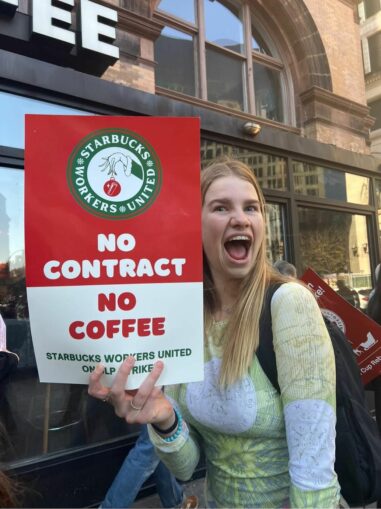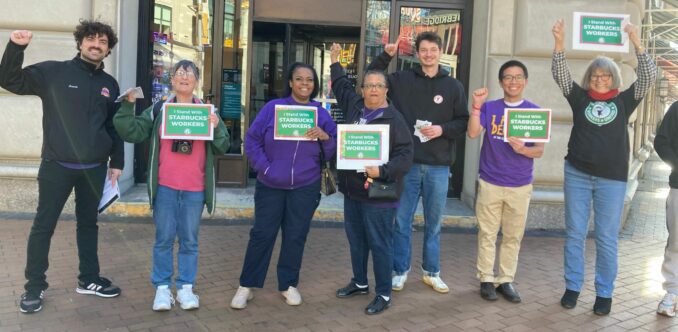Red Cup Rebellion strike at 200+ Starbucks stores
Thousands of Starbucks workers across the country organized over 200 one-day Unfair Labor Practice strikes on Red Cup Day, Nov 16. It is one of the hardest days for baristas to work, especially with severe staff shortages. On that day, workers have to make many more specialty drinks than usual, to increase Starbucks’ profits, plus give out free plastic red cups and coupons.
The primary demand of the Red Cup Rebellion was for contract negotiations to address poor staffing, provide consistent scheduling and stop the firing of union organizers. Two years after the first Starbucks store unionized in Buffalo, New York, and with 360+ stores represented by Starbucks Workers United, the company has still not negotiated a single contract. Failure to negotiate constitutes an Unfair Labor Practice under U.S. labor law.
Here is a sample of the many actions that were part of the Red Cup Rebellion.

New York City, Nov. 16, 2023. WW Photo: Toni Arenstein
In the New York City region, there were five picket lines in different boroughs and on Long Island. At the Astor Place store in Manhattan, 50 workers and supporters on the picket line chanted “What do we want? Contract. When do we want it? Now” and “What’s disgusting? Union busting? What’s appalling? Contract stalling.”

Buffalo, New York, Nov. 16, 2023. Photo: Michelle Eisen
In Buffalo, New York, two stores, the Elmwood store and Genesee Street store (the first and second to unionize in the U.S.) went on strike. Meanwhile, organizers from the Marxist Youth League, Workers World Party and other community supporters leafletted in support of workers at multiple non-union stores across the city.

Cleveland, Nov. 16, 2023. WW Photo: Martha Grevatt
Starbucks workers struck three unionized stores in Greater Cleveland. Union supporters leafletted customers at a downtown store that is not yet unionized. The action downtown was organized by Service Employees Union (SEIU) Local 1 with members of other unions participating.
In Seattle, where Starbucks has its corporate headquarters, and around Washington state, there were a number of stores hit with picket lines. A militant action took place outside the Roastery, a major tourist trap.
Many stores across the country were shut down by the strike.
Toni Arenstein, Jim McMahan and Arjae Red contributed to this article.

